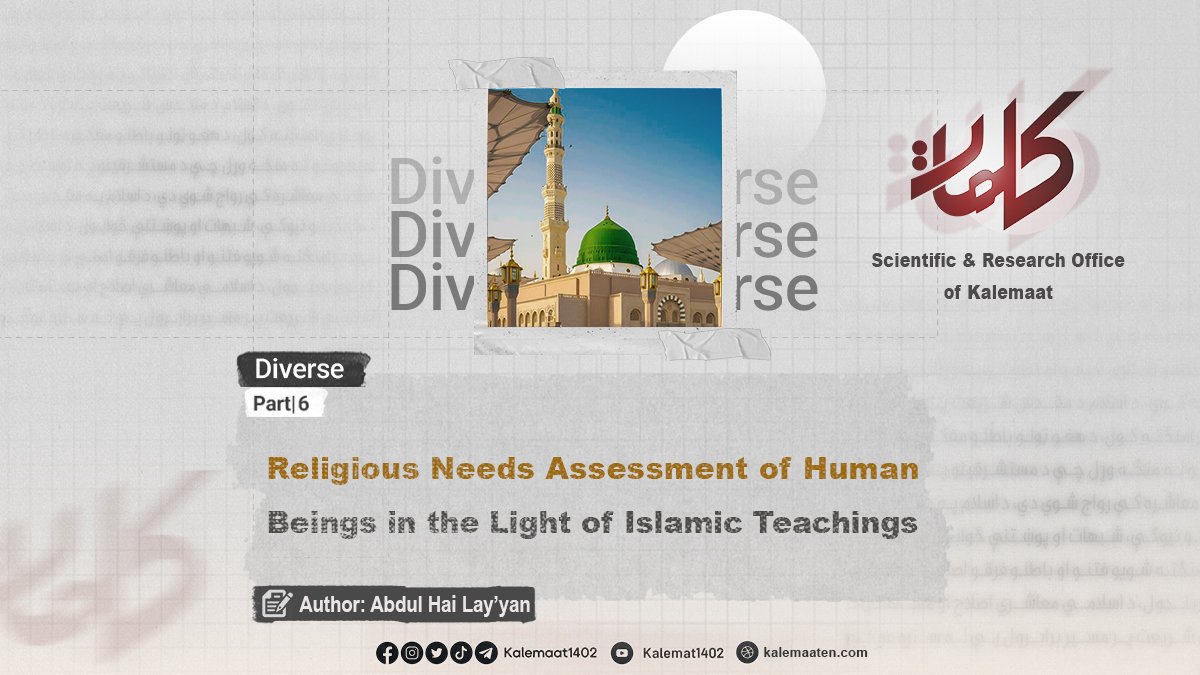Author: Abdul Hai Lay'yan
Religious Needs Assessment of Human Beings in the Light of Islamic Teachings (part 6)
Continuation of the criteria by which the true religion can be distinguished from the false one:
-
The true religion confirms and completes the great religions and principles brought by the previous prophets (peace be upon them), while at the same time clarifying the truths that people have distorted in their teachings.
For example, the Jews accused the Prophet of Allah, Solomon (peace be upon him), of practicing magic and claimed that he ruled over jinn and humans through sorcery.
The reason for this mistake was that, after the death of Solomon son of David (peace be upon them both), the devils wrote down various forms of magic and included in them the following:
“Whoever wishes to attain such and such, must do such and such.” (1)
When they had written these types of magic, they placed them in a book and sealed it with a seal resembling the seal of Solomon (peace be upon him). On the cover, they wrote:
“This is a writing which Asif ibn Barkhiya, the faithful companion, has written for King Solomon son of David (peace be upon them both) from the treasures of his knowledge.”
Then they buried it beneath the throne of Solomon (peace be upon him). Afterward, when the descendants of the Children of Israel became corrupted, they found that book and said: “Solomon son of David (peace be upon them both) gained his power only through this (magic).” (2)
In this way, magic spread among the people; they learned it and taught it to others—so much so that no one practiced it more than the Jews.
When the Messenger of Allah (peace be upon him) mentioned Solomon son of David (peace be upon them both) among the prophets in what was revealed to him by Allah, a group of Jews in Madinah said:
“Do you not wonder at Muhammad (peace be upon him)? He claims that Solomon son of David (peace be upon them both) was a prophet! By Allah, he was nothing but a magician.”
In response to their statement, Allah revealed to Muhammad (peace be upon him) this verse in the Qur’an: (3) «وَاتَّبَعُواْ مَا تَتْلُواْ الشَّیاطِینُ عَلَى مُلْكِ سُلَیمَانَ وَمَا كَفَرَ سُلَیمَانُ وَلَكِنَّ الشَّیاطِینَ كَفَرُواْ یعَلِّمُونَ النَّاسَ السِّحْرَ.» (4) Translation: (And they followed what the devils falsely related concerning the kingdom of Solomon; but Solomon did not disbelieve; rather, the devils disbelieved, teaching people magic.) [Al-Baqarah: 102]
This declaration of the innocence of the prophets is one of the qualities of a true religion. The prophets (peace be upon them) were all truthful in what they conveyed from their Lord and are free from the moral and practical deviations that people falsely attribute to them.
Therefore, the final religion is the one most deserving to clarify the truth in this matter; because if people were to remain upon the falsehoods attributed to the prophets (peace be upon them), that would contradict the wisdom of the One Who sent them.
Hence, it was necessary that the true religion include the details of the previous religions, clarify what befell them after the prophets (peace be upon them), and fill the gap that arose; otherwise, the purpose of the revelation of religions and the mission of the prophets and messengers (peace be upon them) would not be fulfilled.
-
The true religion must have a lasting mission until the end of the world and be universal for all humankind — in which duties and rights are equal, not belonging to a specific class, nor suitable for one people and unsuitable for another.
Allah Almighty says: «قُلْ یا أَیهَا النَّاسُ إِنِّی رَسُولُ اللّهِ إِلَیكُمْ جَمِیعاً الَّذِی لَهُ مُلْكُ السَّمَاوَاتِ وَالأَرْضِ.» (5) Translation” (Say, O mankind! I am indeed the Messenger of Allah to you all — to Him belongs the dominion of the heavens and the earth.) [Al-A‘raf: 158]
And He commanded His Prophet (peace be upon him) to say to his people: «وَأُوحِی إِلَی هَذَا الْقُرْآنُ لأُنذِرَكُم بِهِ وَمَن بَلَغَ.» (6) Translation” (And this Qur’an has been revealed to me that I may warn you thereby, and whomever it reaches.) [Al-An‘am: 19]
With the cessation of divine revelation, the coming of prophets (peace be upon them) also ceases. This necessitates that the final revealed religion must possess such characteristics, so that the great purposes behind the descent of previous religions may also be achieved through it.
Every fair-minded person knows that there is no system to follow, nor path to adhere to, that fulfills these standards as completely as the way of Islam.
Allah the Exalted says regarding Islam: «الْیوْمَ أَكْمَلْتُ لَكُمْ دِینَكُمْ وَأَتْمَمْتُ عَلَیكُمْ نِعْمَتِی وَرَضِیتُ لَكُمُ الإِسْلاَمَ دِیناً.» (7) Translation: (Today I have perfected your religion for you, completed My favor upon you, and have chosen for you Islam as your religion.) [Al-Ma’idah: 3]
Islam, in all the aspects mentioned, is complete and perfect; it is suitable for all people and makes no distinction between human beings.
To be continued…
Previous Part / Next Part
References:
- Ibn Jarir al-Tabari, Jami‘ al-Bayan fi Ta’wil al-Qur’an, Beirut: Dar al-Kutub al-‘Ilmiyyah, 1971 CE, vol. 2, pp. 407–408.
- , vol. 2, pp. 407–408.
- Al-Baqarah: 102.
- Al-A‘raf: 158.
- Al-An‘am: 19.
-
Al-Ma’idah: 3.



